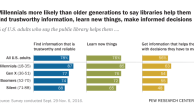In addition to asking people for their preferences on some new library services, we also asked respondents whether they would themselves use a variety of possible new activities and features at libraries. Our list was weighted towards services that are rooted in technology and allow more tech-related interactions with libraries and at them.

These items are discussed further individually below.
An online research service where you could pose questions and get responses from librarians
Over three-quarters (77%) of Americans under the age of 30 say they would be interested in an “Ask a Librarian” type of online research service, where they could pose questions and get responses from librarians; some 37% say they would be “very likely” to use this type of resource. Americans ages 65 and older were least likely to express a strong interest in this resource.
A program that allowed people to try out the newest tech devices or applications
Overall, 73% of respondents ages 16-29 say they would be interested in a “technology petting zoo” program that allowed people to try out the newest tech devices or applications; some 36% say they would be “very likely” to use such a service. About four in ten Americans under the age of 65 said they were “very likely” to use this type of program, significantly more than the 22% of those ages 65 and older who say this.
Personalized online accounts that give you customized recommendations for books and services based on your past library activity
Some three-quarters (75%) of respondents ages 16-29 say they would be interested in personalized online accounts that provide customized recommendations for books and services based on their past library activity, similar to the recommendations offered by commercial sites like Amazon—significantly more than older adults. Some 35% say they would be “very likely” to use a service with customized book recommendations.
A cell phone app that allows you to access and use library services from your phone and see what programs the library offers
Overall, 77% of respondents ages 16-29 say they would be likely to use library a cell phone app that would allow them to access and use library services from their phone; some 42% say they would be “very likely” to use such an app. As discussed earlier in the report, 13% of those ages 16 and older have visited library websites or otherwise accessed library services by mobile device in the past year, including 18% of those under age 30.25
Younger respondents, specifically those under the age of 50, were significantly more likely than older adults to express an interest in mobile library apps.
Library kiosks located throughout the community where people can check out books, movies or music without having to go to the library itself
Overall, 76% of respondents ages 16-29 say they would be likely to use library kiosks located throughout the community where people can check out books, movies or music, similar to Redbox’s DVD rental service; some 44% say they would be “very likely” to use such kiosks. Respondents under age 50 are significantly more likely than older adults to express strong interest in kiosks.
A cell phone app that helps you locate material within the library by guiding you with GPS
Overall, 75% of respondents ages 16-29 say they would be interested in a GPS-driven cell phone app that helps patrons easily locate material within the library, significantly more than older adults; some 45% say they would be “very likely” to use this type of app. Younger respondents, specifically those under the age of 50, were more likely than older adults to express a strong interest in location-driven apps.
E-book readers already loaded with the book you want to read
Overall, 68% of respondents under age 30 say they would be likely to check out pre-loaded e-readers if their library offered them, significantly more than older adults; some 32% say they would be “very likely” to take advantage of this service.
Respondents ages 65 and older are the least likely to be interested in this service—just about four in ten say they would be likely to use pre-loaded e-readers, overall; meanwhile, previous research has shown that Americans ages 16-17 who don’t already borrow e-books are significantly more likely than older non-borrowers to be interested in this service, although the sample size was too small in this survey to report those numbers.
A digital media lab where you could create and upload new digital content like movies or your own e-books
As was discussed earlier in the report, 67% of Americans ages 16-29 say they would be interested in a digital media lab where patrons could create and upload new digital content, significantly more than older adults; some 27% say they would be “very likely” to use such a resource.
Adults 65 and older were the least likely to say they would be likely to use such a lab—32% said they would be likely to use them overall, compared with over half of younger respondents, and just 15% said they would be “very likely” to use them.
Classes or instruction on how to use handheld reading devices like e-book readers and tablet computers
Almost half (47%) of respondents under the age of 30 say they would be interested in classes on how to use handheld reading devices like e-book readers and tablet computers, including 17% who say they would be “very likely” to take these classes. Adults ages 50-64 were significantly more likely than most other age groups to express a strong interest in this service, with 30% saying they would be “very likely” to take these classes.
Classes or instruction on how to download library e-books to handheld devices
Almost half (56%) of respondents under the age of 30 say they would be interested in classes on how to download library e-books to handheld devices, including 24% who say they would be “very likely” to take these classes. Adults ages 30-49 and 50-64 were particularly likely to express an interest in this service, with about one in three saying they would be “very likely” to take these classes.



